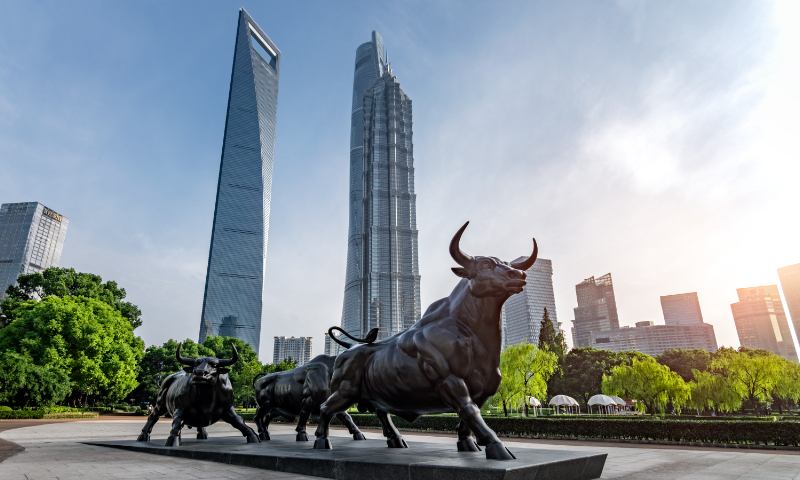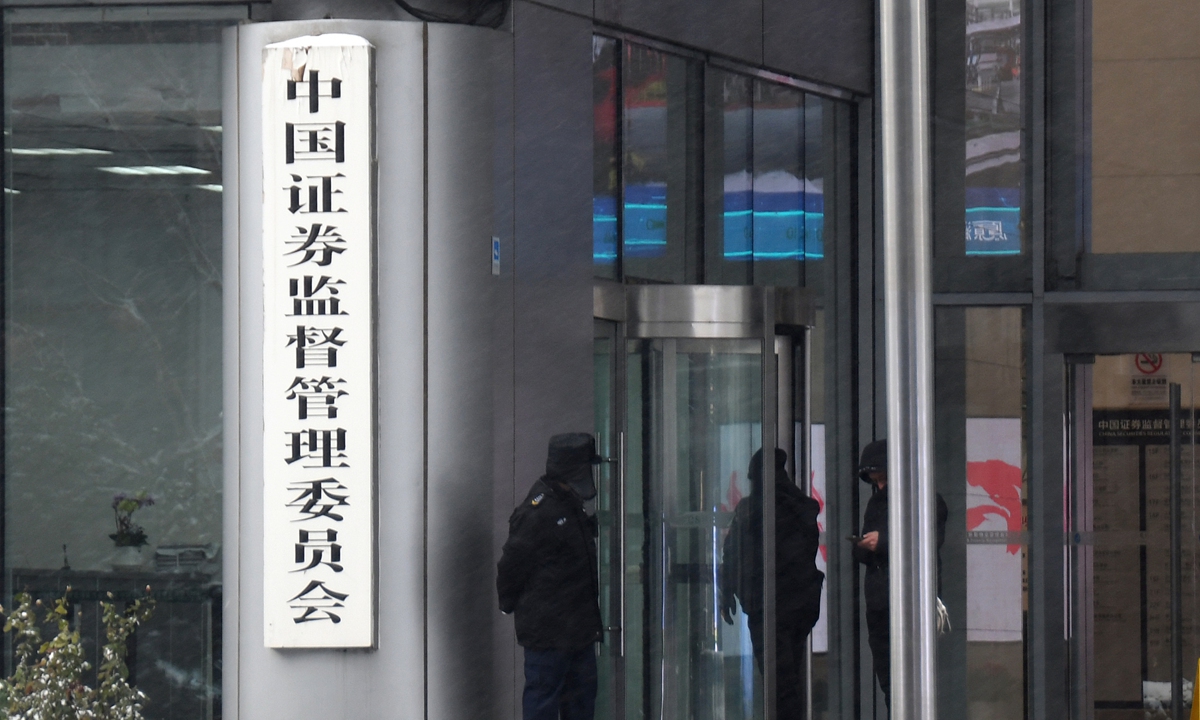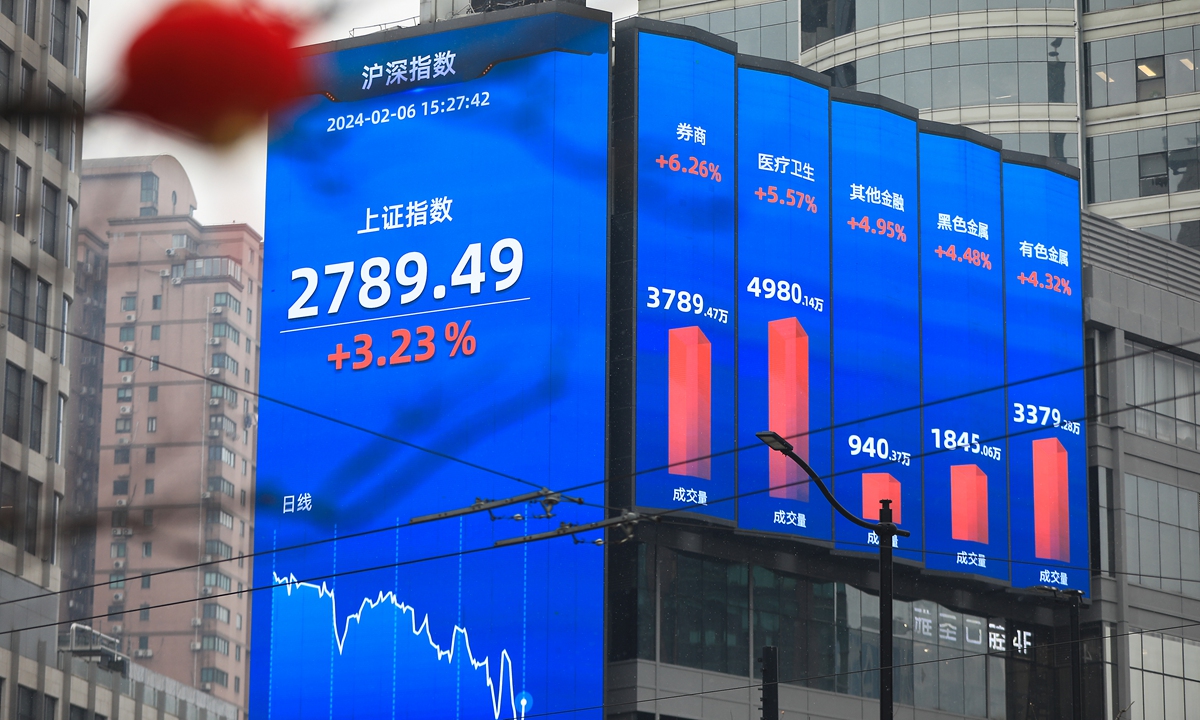Global financial institutions speed up investment in China
Nation sets goal of becoming powerhouse, will create more opportunities for int’l capital

A view of Lujiazui financial hub in Shanghai File photo: VCG
Qatar's sovereign wealth fund has reportedly agreed to purchase a 10 percent stake in China Asset Management Co (ChinaAMC), the country's second-largest mutual fund firm, as international financial institutions have stepped up holding of yuan assets amid the rapid recovery of Chinese economy and growing risks in the US financial market.
Analysts said China's accelerated moves in building itself into a financial powerhouse as well as firm commitment to opening-up will create more opportunities for international capital. They expressed confidence in China's ability to achieve this year's GDP growth target, as targeted macro-policies continue to take effect and external demand shows resilience.
The Qatar Investment Authority (QIA) has agreed to buy the stake in ChinaAMC from investment firm Primavera Capital, Reuters reported on Tuesday, citing sources with knowledge of the situation.
The Qatar sovereign fund's proposal has been submitted for Chinese regulatory approval, it said.
The QIA and ChinaAMC didn't immediately comment when reached by the Global Times on Wednesday.
Bian Yongzu, a senior industry research fellow, told the Global Times on Wednesday that the reported deal shows that international institutions are accelerating their investments in China.
"Amid global uncertainties, the Chinese market is a good place to diversify portfolios and explore value, as the Chinese economy is recovering rapidly thanks to a series of targeted policies, and the economic fundamentals are stable and resilient," Bian said.
Given the growing ties between China and Middle Eastern countries in recent years, it has become more convenient for capital from countries like Saudi Arabia to flow to China, he said.
Attendees at the just-concluded 10th ministerial conference of the China-Arab States Cooperation Forum also vowed to promote bilateral and multilateral cooperation in fields such as investment and finance. The Chinese side stressed that it supports closer cooperation among financial institutions from the two sides, and welcomes Arab banks to join the Cross-border Interbank Payment System.
This year, many international financial institutions have briskly increased their investments in China. For example, AllianceBernstein, a global asset management company, announced in May an increase in the registered capital of its branch in China from 200 million yuan ($27.62 million) to 300 million yuan.
Chinese financial regulators have announced a raft of policies to promote opening-up in the financial sector and capital market reforms, boosting the task of building the country into a financial powerhouse, Tian Xuan, a vice president of the Tsinghua University PBC School of Finance, told the Global Times.
In April, the State Council, the cabinet, released a new guideline on strengthening regulations, forestalling risks and promoting the high-quality development of the capital market. This was the third guideline document on the capital market from the State Council in two decades.
Under the new guideline, the China Securities Regulatory Commission has rolled out measures to improve the ecosystem of the country's capital market. The securities regulator announced five measures to boost cooperation between capital markets in the Chinese mainland and Hong Kong, reaching a new opening-up model featuring multiple channels and mechanisms, according to Tian.
UBS analysts said in a note sent to media outlets on Wednesday that they believe China's stock market is strengthening to a lasting recovery from a technical rebound. As a result, they said they have turned bullish on the market and further raised the year-end target for the MSCI China Index to 69, which would be a rise in the mid double digits from the current level.
Goldman Sachs noted in a recent report that the MSCI China Index had recovered 31 percent from its low in late January, outperforming most developed and emerging markets. The firm attributed the sound performance to a variety of factors, including the resilient Chinese economy and macro-policy support for the property and capital markets.
On the back of strong first-quarter GDP growth in 2024 and recent policy measures, international organizations have intensively upgraded China's economic growth forecasts for 2024, with the IMF having raised its forecast to 5 percent from the April projection of 4.6 percent.
Wen Bin, chief economist at China Minsheng Bank, told the Global Times that these upward revisions show that the international community is re-evaluating the resilience of China's economy.
Since May, a series of forceful policies have been rolled out, including the issuance of ultra-long term special treasury bonds and real estate support policies, which are expected to inject new energy into the economic rebound, Wen said.
"As those policies continue to produce effects and external demand remains resilient, China's economy is expected to reach its growth goal this year," he said.
In one positive sign, the private-sector purchasing managers' index for the manufacturing sector released by Caixin hit 51.7 in May 2024, the highest level since July 2022. The reading, which was up 0.3 points from April, indicates gains in vitality across the nation's massive number of small and mid-sized manufacturing firms.


